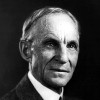“ We must hold a man amenable to reason for the choice of his daily craft or profession. It is not an excuse any longer for his deeds, that they are the custom of his trade. What business has he with an evil trade? Has he not a calling in his character. Each man has his own vocation. The talent is the call. There is one direction in which all space is open to him. ”
Ralph Waldo Emerson, Spiritual Laws (1841). copy citation
| Author | Ralph Waldo Emerson |
|---|---|
| Source | Spiritual Laws |
| Topic | choice custom |
| Date | 1841 |
| Language | English |
| Reference | in "Essays: First Series" |
| Note | |
| Weblink | https://en.wikisource.org/wiki/Essays:_First_Series/Spiritual_Laws |
Context
“But that which I call right or goodness is the choice of my constitution; and that which I call heaven, and inwardly aspire after, is the state or circumstance desirable to my constitution; and the action which I in all my years tend to do, is the work for my faculties. We must hold a man amenable to reason for the choice of his daily craft or profession. It is not an excuse any longer for his deeds, that they are the custom of his trade. What business has he with an evil trade? Has he not a calling in his character.
Each man has his own vocation. The talent is the call. There is one direction in which all space is open to him. He has faculties silently inviting him thither to endless exertion. He is like a ship in a river; he runs against obstructions on every side but one; on that side all obstruction is taken away, and he sweeps serenely over a deepening channel into an infinite sea.”
source



